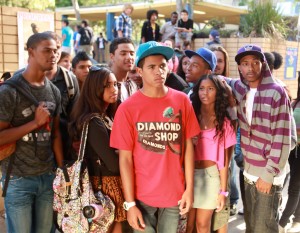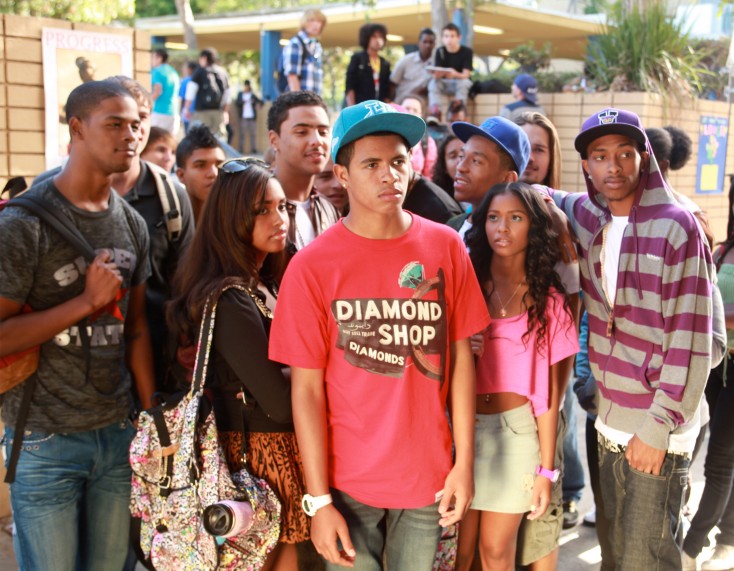
(center left to right) Maya Van Peebles, Mandela Van Peebles and Simone Battle in "We The Party." (Click on photo for hi-res version)
By ANGELA DAWSON
Front Row Features
HOLLYWOOD—Mario Van Peebles made his first feature film two decades ago with the urban crime drama “New Jack City.” A second-generation filmmaker—his father is legendary auteur Melvin Van Peebles—he is now ushering in another generation of artists with a coming-of-age comedy set within America’s first black presidency.
“We the Party” is a multicultural comedy about a group of Los Angeles teenagers dealing with issues both contemporary as well as timeless (i.e. getting a date for prom, dealing with bullies and becoming a man.)
Van Peebles, an actor as well as a filmmaker, was inspired to write, direct, produce and star in “We the Party” based on observations of his own teenagers (he has three boys and two girls, who all appear in the film). Audiences will know recognize Van Peebles from his various film and TV roles including playing a con artist in 1980s TV series “Sonny Spoon,” and depicting Malcolm X in 2001’s boxing drama “Ali.”
Set against the backdrop of the latest pop, rap and hip hop music and dance crazes, “We the Party” features Snoop Dogg, YG, The New Boyz, The Rej3ctz as well as 17-year-old Mandela, who plays the central character, Hendrix and his brother, Makaylo, who plays another character nicknamed “Obama” because of his keen intelligence.
The director was joined by two of his sons to talk about the making of the new comedy, which recalls such classic Hollywood mainstays as “The Breakfast Club” and “House Party.” While many parents lament being unable to communicate with their teens, it turns out Van Peebles has a connected to his progeny through his art and by truly listening to what they have to say.
Front Row Features: Were there certain films you wanted them to watch before you made “We the Party?”
Mario Van Peebles: They’ve been doing that for a while just within our family. Part of being in the Van Peebles clan is that you have to have some film knowledge. Part of the fun for my father and me is sharing (our knowledge of film) with them. When we were getting ready to do the movie, I wanted them to see the classic coming-of-age films, but not so they would imitate them but just seeing the things in them I liked.
Front Row Features: What other kind of films have you watched together as a family?
Mandela Van Peebles: We have Wednesday night classic movie night. We saw “One Flew Over the Cuckoo’s Nest,” “Citizen Kane.”
Front Row Features: Did you give your dad input into the script?
Makaylo Van Peebles: Most of the events in the movie are inspired by things that happened to me and my brothers and sisters. For example, when I went to public school for the first time, my nickname became Obama. The story behind that is long, but the idea was that people were starting to see what smart and black looked like together.
Mario: I wanted to show not just what thug life or hip-hop life looked like, but how, over the past four years, with a black president in office, smart has become the new gangsta.
Front Row Features: The plot revolves around Hendrix planning a house party in hopes of impressing a girl. Was that based on a real event?
Mandela: Our dad is known to be… what’s the word?
Mario: Frugal.
Mandela: Right. He’s really good at saving money. For birthday presents, he gives my brother and I the same amount of money every year. We saw what other people were getting for their birthdays and it’s a lot more than we get. Our neighbor, who inspired (Chowder, a rich kid played by Patrick Cage II), had a graduation party you wouldn’t believe. For our birthday, we decided to pool our money together, hire a deejay, hire some security, get a few sodas and cups and whatnot, and throw a party at our house.
Makaylo: We charged (the guests) for it too.
Mandela: $10 a person. We came away with so much money. We had at least 500 people there. It was huge.
Front Row Features: (To Mario) Were you aware this was going on?
Mario: They ran it by me.
Mandela: It wasn’t “Project X” (the hit “found-footage” type comedy where a house party gets out of control).
Mario: I was really on the fence about it. Then I finally decided to left them go for it. I had no idea it would be this big, and it would give birth to the whole movie idea.
Front Row Features: You videotaped it, right?
Mario: I did. I was looking at the footage and I said (he snaps his fingers), “That’s the movie!” So I was taping, writing notes, but I hadn’t fit it into a story yet. It just sort of came together in pieces.
Front Row Features: The film is a comedy, but deals with serious issues such as bullying, prejudice, class and social pressure.
Mario: Some of the themes that arise in “We The Party” were organic, in that they were themes that were coming up with raising kids. So in the context of raising kids, I felt like you can’t be afraid to complete the conversation with your kids that society’s already started. If they’re exposed to hyper-materialism, that’s an interesting conversation to move down the court. Front Row Features: It seems like you and your kids have good communication.
Mario: We do. Those conversations that came up in the context of the movie were conversations I’ve had with them already. We’ll be riding in the car and I’ll come up with my Mario-isms, like “Minimal effort now means…”
Mandela: “…minimum wage later.” He gets that kind of stuff from our granddad.
Mario: That was fun to take in essence what would be a party flick and let it have organically nutritional value. I remember when they went to View Park (a Los Angeles public charter school), I would tease them (with an upper crust voice), “Father, are you going to pick us up for lunch today?” “No, y’all on your own.” One day Makaylo was saying, “Is it OK if we have friends over?” and Mandela was saying, “It’s probably not a good idea yet because there’s a line of haves and have-nots, and we’re haves.” He said, “I’d rather they get to know us for who we are before we invite them up.” But Makaylo’s point was equally salient because he said, “That is who we are.” Some of those things that came up organically I wanted in the film.
Front Row Features: How are the themes in your film relevant today?
Mario: Jackie Robinson playing baseball didn’t mean baseball was integrated, and Obama being president doesn’t mean we’re in a post-racist society. Someone pointed out the center guy in our movie poster has a hoodie on and looks like (slain Florida teen) Trayvon Martin.
Mandela: It’s crazy just the timing of this coming out in light of the Trayvon Miller case. The character C.C., who is played by (rapper) YG, is just a misjudged, pre-judged person. He exudes this negativity and you don’t really know why. Is it the tattoos on his hands or the fact you can’t see his face from under the hoodie? My character befriends him and he sees a whole different side to C.C.’s life that he wouldn’t have seen if he just labeled him a bad guy.
Front Row Features: How were you able to separate dad from director on this?
Makaylo: As far as being dad and being the director on the set, it’s something we’ve had for a long time. When we were little, he’d take us to his sets, so it’s helped us not only on the acting side of things but it’s also helped us see what goes on behind the scenes. It’s something that’s benefitted us. I know when he’s Mario Van Peebles and when he’s dad.
Mandela: He’s easy to read. His eyes get really intense. You have to know he’s coming from a place of love. He’s our father and he doesn’t want to see us fail. He just wants to see us do our best.
Mandela: Actually, he just uses mind tricks. (He laughs.)
Front Row Features: How do you direct your kids, Mario?
Mario: Since I’m also acting in the film I can also show them. It’s like learning dance from a dance teacher. I’m used to crossing those lines (of director and actor). You realize quickly when you don’t have a huge budget for the production—I paid myself $1 to direct it and $10 to write it—and we’re investing in the movie ourselves. A lot of what it comes down to when you can’t pay people a lot of money you have to inspire them, be fun, be fun to work with.
Front Row Features: Are you preparing the next generation of filmmakers?
Mario: Maybe. Just because they enjoy doing it now, doesn’t mean they’ll make a living at it. We don’t know where entertainment will be when they’re grown up. Since I made “New Jack City,” the cinematic middle-class has evaporated. More people can make films now but it’s harder to get distribution. We don’t know where technology is going.
Makaylo: I was watching “Six Degrees of Separation” on my phone the other day.
Mario: That’s blasphemous! (He laughs.)





